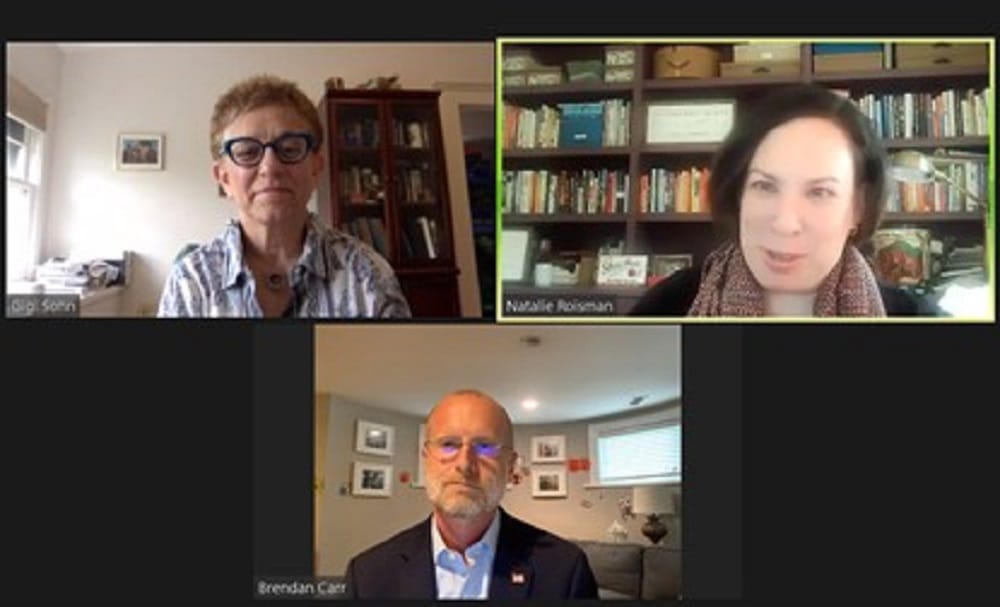Brendan Carr Thinks FCC Has Section 230 Authority, But Not Others at Communications Association Event
September 29, 2020 – Federal Communications Commissioner Brendan Carr was the odd man out in a conversation about Section 230 in that he actually believes that his agency has the authority to interpret the significant internet statute, he said. In a Thursday discussion hosted by the Federal Communic
Liana Sowa

September 29, 2020 – Federal Communications Commissioner Brendan Carr was the odd man out in a conversation about Section 230 in that he actually believes that his agency has the authority to interpret the significant internet statute, he said.
In a Thursday discussion hosted by the Federal Communications Bar Association, Avery Gardiner, senior fellow for competition, data, and power at the Center for Democracy and Technology; Gigi Sohn, distinguished fellow at Georgetown Law Institute for Technology Law and Policy; Jamie Susskind, vice president of policy and regulatory affairs at Consumer Technology Association, and Olivier Sylvain, law professor at Fordham University; disagreed.
Not all of those who denied FCC authority were complete cheerleaders for Section 230: Several believed that it should be subject to legislative change.
But none felt that the FCC has the authority Carr said it has.
“Section 230 is a self-effectuating statute,” said Susskind for CTA. “Section 230 (c), I should say, contemplates no role from the FCC, and historically the FCC has never attempted to take a role.”
But Carr said he disagreed. “The FCC [has] the authority to clarify and interpret Section 230.”
Carr cited City of Arlington, Texas v. FCC, a Supreme Court decision dealing with the FCC’s authority under Section 332 of the Telecom Act, as well as further litigation involving Section 253, both sections of which address the FCC’s authority vis-à-vis state and local governments.
“When Congress inserts a provision into Title II, it does so knowing that the Section 201 rulemaking authority is going to apply to whatever they insert,” he said. “So, the question is, did Congress write something that unambiguously precludes the conclusion that 201 and rulemaking authority should apply?”
Sohn and Susskind argued that there was “absolutely nothing in the plain language” that argued for FCC authority. At the outset of the 1996 law, former Rep. Chris Cox, R-Calif., and now-Sen. Ron Wyden, D-Ore., stated “We don’t want a federal computer commission.”
But Carr simply took this as more of a challenge: “The question that comes out of this is how can you square your view on net neutrality with your view on 230?” he asked himself. “And I can do it. Here’s how.”
He said that he believed that the recent petition filed by the Trump Administration through the Commerce Department’s National Telecommunications and Information Administration was an effort to give meaning to the words in Section 230(c).
From where does the authority to impose transparency rules come?
Sohn responded, “It’s one thing to say the FCC has authority to interpret what ‘good faith’ means. It’s another thing to say that they have the right to enact transparency rules on top of that, and to that I would say, where?”
Carr agreed that FCC shouldn’t look to Section 230 for imposing requirements that tech platforms comply with transparency requirements.
“That comes more from the need to report obligations that we look to for authority to apply our transparency rules to [internet service providers],” Carr said. He also argued that the FCC “has a bigger role to play in enforcing terms of service public representations some of these platforms have made.”
“I get really nervous when we talk about federal mandates on transparency,” said Gardner of CDT. For big companies like Facebook and Google these mandates wouldn’t be a problem, but for smaller companies a federal mandate could significantly harmful market entry, she said.
While some feel this tradeoff is worth it, Gardiner warned against “accidently” introducing this provision and creating a harmful to entry environment.
Sylvain of Fordham said he supported the “common sense” bipartisan efforts to change Section 230 along procedural grounds. He called for a further exploration about how implicated platform intermediaries are in content creation, and said that intermediaries are not like the electronic bulletin boards of the past.
Because of their location in the market and their two-sided position between advertisers and users, intermediaries are reshaping the way consumers get news, he said.
Sohn also said that policy-makers need a better model for reform of Section 230. She referenced and was supportive of the procedural changes proposed by Sens. Brian Schatz, D-Hawaii, and John Thune, R-N.D. The Schatz-Thune bill would impose transparency rules, obligations for appeal, and an obligation for platforms to take down anything they see that’s unlawful.











Member discussion